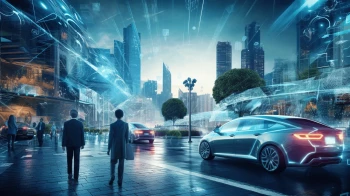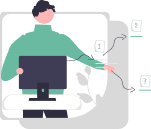The evolution of artificial intelligence (AI) is shaping the future in unprecedented ways. From transforming industries to changing the way we live and work, AI's impact is profound and far-reaching. This article delves into the exciting potential, challenges, and future trends of artificial intelligence.
1. AI in Industries
AI is poised to revolutionize industries across the board. In healthcare, AI-driven diagnostics and personalized treatment plans will improve patient outcomes. In finance, AI algorithms will enhance fraud detection and streamline trading. Manufacturing will see increased automation, leading to efficient production processes. AI-powered agriculture will optimize crop yield through predictive analytics. The integration of AI into various sectors will boost efficiency, accuracy, and innovation.
2. Smart Cities and IoT
AI's role in shaping smart cities will be pivotal. AI-driven sensors and data analytics will improve urban planning, traffic management, and resource allocation. Smart grids will optimize energy distribution, and AI-enabled waste management systems will enhance sustainability. The Internet of Things (IoT) will work hand in hand with AI, connecting devices and sensors for seamless communication and data-driven decision-making.
3. Healthcare and Medical Breakthroughs
AI's potential in healthcare is vast. It can accelerate drug discovery, predict disease outbreaks, and assist doctors in diagnosing complex cases. Machine learning algorithms will analyze vast amounts of medical data to tailor treatments and predict patient outcomes. Surgical robots will enhance precision, while AI-enabled wearable devices will monitor health in real-time.
4. Ethical and Regulatory Challenges
As AI becomes more integral to our lives, ethical and regulatory challenges emerge. Questions about data privacy, bias in algorithms, and the potential for job displacement need to be addressed. Striking a balance between technological advancement and responsible use of AI requires collaboration among governments, industries, and academia.
5. Human-AI Collaboration
The future of AI isn't about replacing humans; it's about collaboration. AI will augment human capabilities, enhancing decision-making and creativity. Chatbots, virtual assistants, and AI-driven tools will aid in tasks ranging from customer support to content generation, allowing humans to focus on higher-level thinking and innovation.
6. AI in Education
Personalized learning experiences powered by AI will reshape education. Adaptive learning platforms will cater to individual student needs, improving engagement and comprehension. AI tutors will provide immediate feedback and track progress, ensuring effective learning outcomes.
7. Autonomous Vehicles and Transportation
AI is paving the way for autonomous vehicles, promising safer and more efficient transportation. These vehicles will communicate with each other and traffic systems, reducing accidents and traffic congestion. The rise of autonomous vehicles will also influence urban planning, as parking spaces and road infrastructure are reconsidered.
8. AI-Generated Content and Creativity
AI-generated content is becoming increasingly sophisticated. From art and music to writing and design, AI algorithms are creating impressive pieces. However, the authenticity and ethical implications of AI-generated content remain topics of debate.
9. Quantum Computing and AI
The marriage of quantum computing and AI has the potential to accelerate AI's capabilities dramatically. Quantum computers can solve complex problems faster than classical computers, enhancing AI algorithms in fields like cryptography, optimization, and materials science.
10. Continued Research and Innovation
The future of AI is a realm of ongoing research and innovation. As AI technologies advance, breakthroughs will emerge in natural language processing, computer vision, and more. Researchers and engineers will push the boundaries of what AI can achieve.
Conclusion
The future of artificial intelligence is both thrilling and challenging. From transforming industries and healthcare to reshaping cities and education, AI's potential is boundless. However, addressing ethical concerns, regulatory frameworks, and the impact on jobs will be crucial for harnessing AI's power responsibly. As we step into a world where humans and AI technology coexist, collaboration, adaptability, and a commitment to ethical AI development will define our journey into the AI-driven future.





